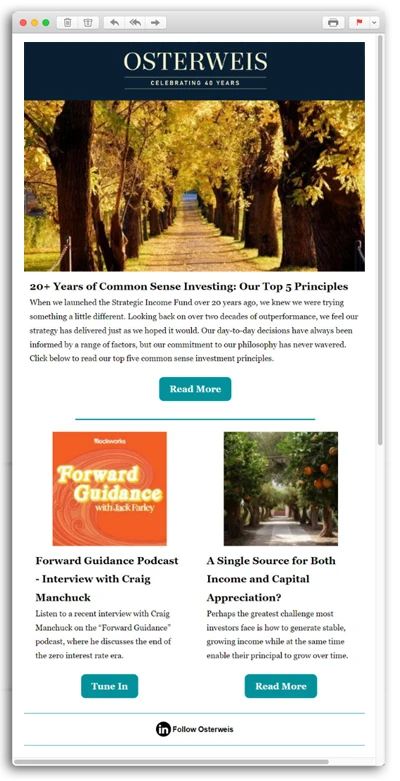Market Perspectives: Our Latest Thoughts on Ukraine
Published on March 8, 2022
The Ukraine conflict has escalated rapidly, creating a massive humanitarian crisis and increasing volatility across financial markets. In this piece we review the major economic implications of the war and discuss the steps we are taking to manage the impact on portfolios.
Clearly the situation in Ukraine has taken a turn for the worse and does not appear to have a short-term resolution. Invading and occupying a country of over 40 million people is a monumental task and so far, we don’t believe it has gone as planned for Russia. The intensity of economic sanctions has risen substantially, and President Biden has announced that the U.S. will stop importing Russian oil. Without an offsetting increase in supply either from other sources and/or a loosening of drilling restrictions in the U.S., we will likely see further increases in the cost of energy, which has already gone up significantly since the war began. Russia and Ukraine are also very large exporters of wheat. It does not take a geopolitical expert to see that the price of flour and in turn, bread, could also be rising. Most of Russia’s wheat exports go to the Middle East and Africa, and as you may recall this was one of the drivers of the Arab spring uprisings.
While we cannot forecast what will happen, we do know that people are incredibly adaptable and creative when dealing with hardships. This is a humanitarian disaster, but globally there appears to be ample supply of most essential raw materials – although we would not be surprised to see price spikes in those, too, as commodities have been getting more expensive since the fighting started. We have seen many predictions in the past about shortages causing the end of things like oil, coffee, and chocolate, only to have higher prices motivate producers to increase production and farmers to shift crops, bringing supply and demand back in balance. We think this time is no different, but timing is the big question.
How does one keep calm when it seems like the world as we know it is coming to an end? In the past when faced with great uncertainty we have found that focusing on what you can control and worrying less about what you cannot is the best path to take. For us, this means keeping an eye on the factors that affect the performance of the companies in which we invest. While it may be hard to look at the television night after night, keep in mind that in the rest of the world people are still going about their daily lives, so shifts in consumption due to the war are mostly confined to those immediate countries and the surrounding areas. Travel and leisure activities in the region will certainly be curtailed, but in time it will shift to other locales. There may be spikes in individual food and commodity prices, but people will make substitutions and find ways to carry on. The wild card here is China. They have been sitting on the fence regarding imposing severe sanctions. It is likely that they would continue to be buyers of Russian commodities, which could contain inflation somewhat in their country, which in turn may keep a lid on their export prices to the rest of the world.
Notwithstanding our constructive longer-term outlook, there is the very real possibility that markets may struggle in the near term. Having a healthy cash cushion seems like a sensible strategy now, as it will not only protect assets if such a downturn materializes but can also allow us to add attractive investments at distressed valuations. If we are wrong and the market takes the news in stride, we do not believe it will immediately reverse course and run away to the upside. It is okay to be an observer with ample liquidity.
Our overall recommendation is to stay the course, which includes having a healthy cash position. Earnings for the S&P 500 were up 31% in the fourth quarter versus year-end estimates of “only” 21% growth. While we expect margins to be initially squeezed due to rising raw material costs for the next couple of quarters, we also believe companies will raise prices, blunting the impact and restoring some, if not all, of the lost profit margins. Additionally, revenues and profits should rise with prices, which means that compared to a fixed amount of debt, leverage ratios should decline, counterintuitively enhancing balance sheets until a point in time when demand falls off. We do not know when that will be. Consumers are in generally good financial health now and job growth and wages continue to rise.
Given Jerome Powell’s latest Congressional testimony and the Fed’s fears of slowing demand in the face of rising inflation, it appears that they will not be too aggressive in raising rates in the near term, causing real interest rates to remain in negative territory for some time. This should provide some support for asset prices (though it will do little to douse the inflationary flames). The Fed seems to be hoping that demand will ebb on its own. Either way, we would consider their less hawkish stance somewhat supportive of markets.
While no one knows the ultimate outcome of Russia’s invasion or the longer-term implications of the resulting refugee crisis, looking out 12 months or more following major conflicts, markets have historically regained their footing. Our advice as always is to invest for the longer term and to not attempt to trade in and out based on headlines. In the near term we are prepared for increased volatility and hope that this ugly chapter comes to a close soon.
Carl Kaufman
Co-President, Co-Chief Executive Officer, Chief Investment Officer – Strategic Income & Managing Director – Fixed Income
Opinions expressed are those of the authors, are subject to change at any time, are not guaranteed and should not be considered investment advice.
The S&P 500 Index is an unmanaged index that is widely regarded as the standard for measuring large-cap U.S. stock market performance.
Mutual fund investing involves risk. Principal loss is possible. The Osterweis Strategic Income Fund may invest in debt securities that are un-rated or rated below investment grade. Lower-rated securities may present an increased possibility of default, price volatility or illiquidity compared to higher-rated securities. The Fund may invest in foreign and emerging market securities, which involve greater volatility and political, economic and currency risks and differences in accounting methods. These risks may increase for emerging markets. Investments in debt securities typically decrease in value when interest rates rise. This risk is usually greater for longer-term debt securities. Small- and mid-capitalization companies tend to have limited liquidity and greater price volatility than large-capitalization companies. Higher turnover rates may result in increased transaction costs, which could impact performance. From time to time, the Fund may have concentrated positions in one or more sectors subjecting the Fund to sector emphasis risk. The Fund may invest in municipal securities which are subject to the risk of default. Investing in foreign and emerging market securities, which involve greater volatility and political, economic and currency risks and differences in accounting methods.
The Osterweis Funds are available by prospectus only. The Funds’ investment objectives, risks, charges and expenses must be considered carefully before investing. The summary and statutory prospectuses contain this and other important information about the Funds. You may obtain a summary or statutory prospectus by calling toll free at (866) 236-0050, or by visiting www.osterweis.com/statpro. Please read the prospectus carefully before investing to ensure the Fund is appropriate for your goals and risk tolerance.
Osterweis Capital Management is the adviser to the Osterweis Funds, which are distributed by Quasar. [OSTE-20220307-0459]


